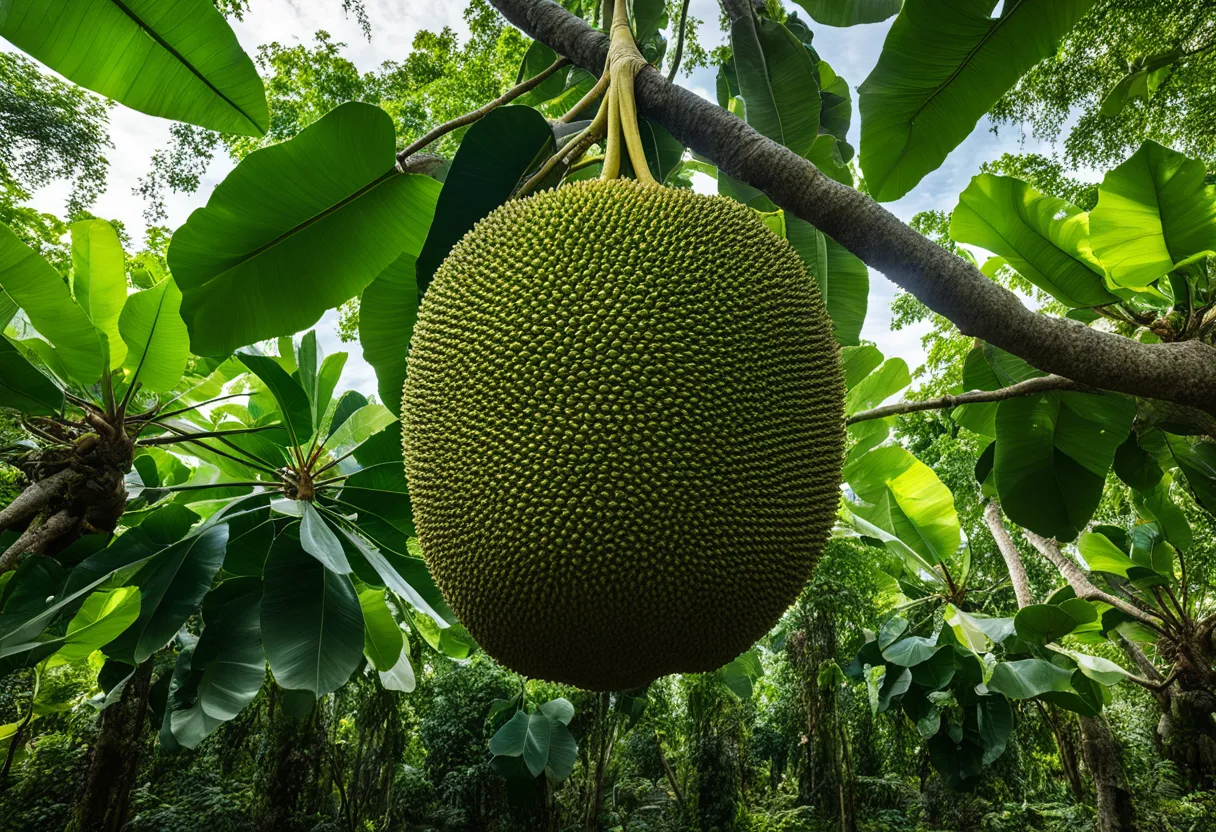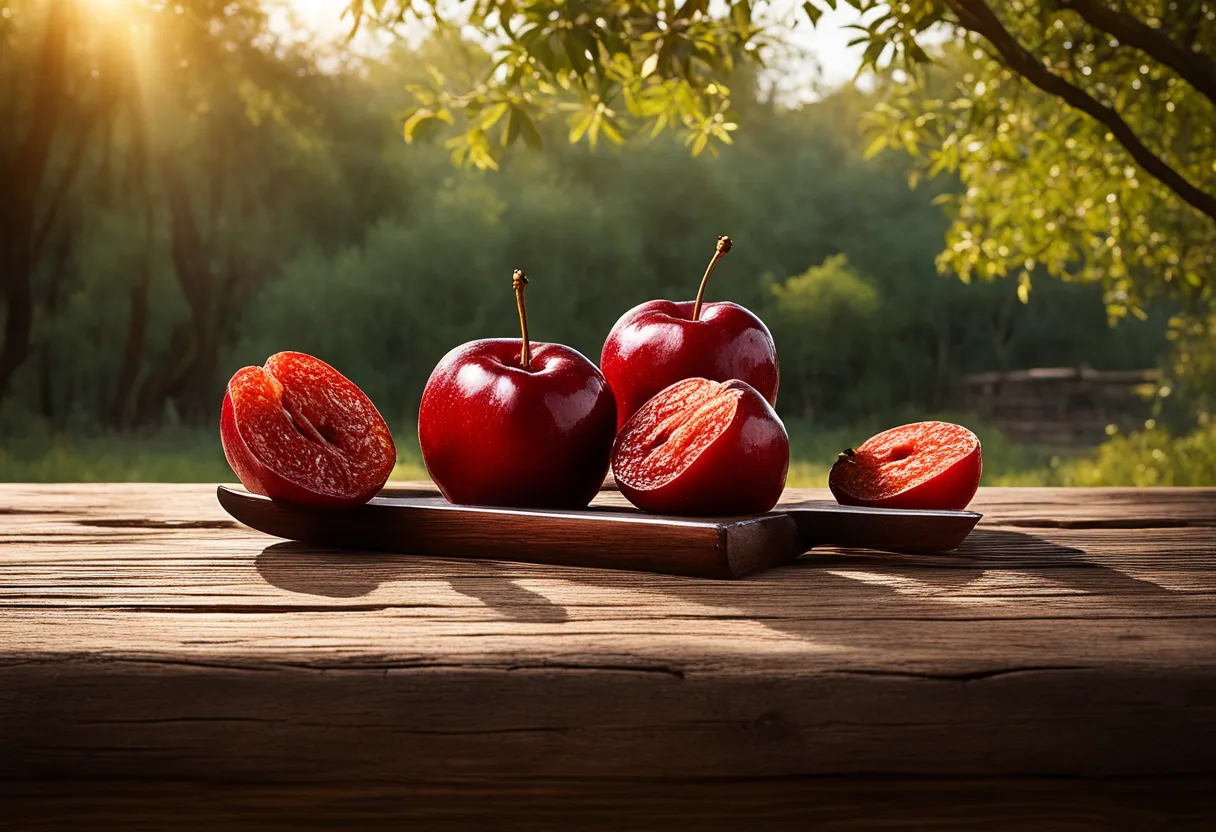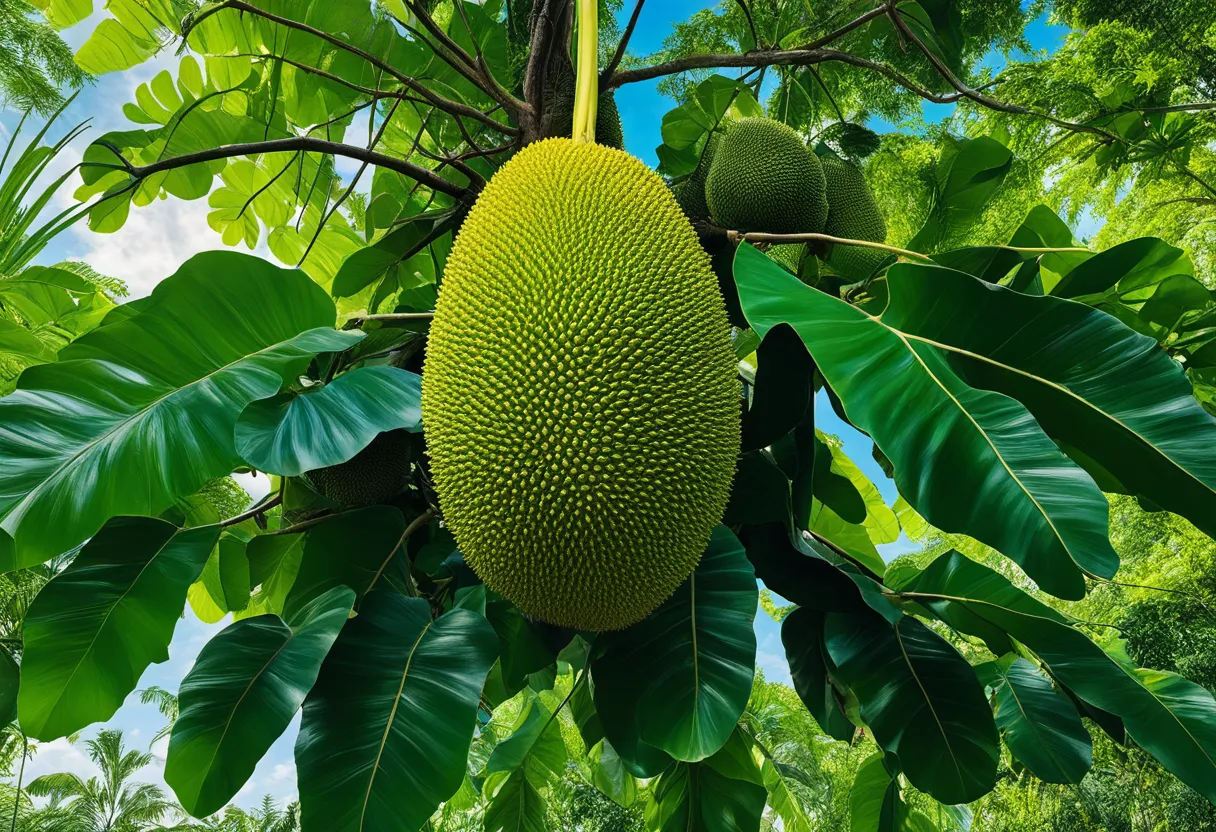Explore the juicy, sweet, and sometimes exotic world of fruits that start with the letter J. From common household names to rare finds, this guide uncovers them all. Imagine biting into a piece of fruit and experiencing a surprise explosion of flavors – that’s exactly what this adventure offers. Whether you’re a culinary enthusiast looking to expand your palate or a health-conscious individual seeking the nutritional benefits of diverse fruits, you’re in for a treat. Let’s dive into the delightful and intriguing universe of J-fruits!
The Jaboticaba is not your everyday fruit. Originating from Brazil, this fruit is a marvel of nature, growing directly on the trunk of its tree – a sight that can cause quite the surprise! Its skin is dark, almost purple, and encases a sweet, tart pulp that is often compared to grapes but with its own unique twist. Not only is it a pleasure for the taste buds, but it’s also packed with antioxidants.
Speaking of surprises, have you ever encountered a Jackfruit? This colossal fruit is the largest tree-borne fruit in the world, capable of reaching up to 100 pounds! Its interior is a labyrinth of sweet, fragrant bulbs of flesh that can be eaten raw or cooked. The flavor? A delightful mix of apple, pineapple, mango, and banana. Jackfruit is a chameleon in the kitchen, used in everything from vegan pulled pork to decadent desserts.
The Jambolan, or Java plum, might not win a beauty contest, but its astringent, sweet-sour flavor makes it a favorite in many parts of the world, especially in India. Beyond its taste, the Jambolan is revered for its medicinal properties, playing a starring role in Ayurvedic medicine to aid in diabetes management and digestion.
Ever tasted a Jujube? This small, apple-like fruit might look unassuming, but its sweet, apple-toffee flavor is anything but ordinary. Native to Asia, Jujubes have been cherished for centuries, not just for their taste but also for their calming and sleep-promoting properties. They’re a testament to the fact that good things often come in small packages.
Last but not least, the Juneberry is a hidden gem among fruits. Its appearance might remind you of blueberries, but its taste is a unique blend of apple, almond, and cherry. Juneberries are not just for fresh eating; they’re also fantastic in pies, jams, or simply as a nutritious snack. Discovering Juneberries is like uncovering a secret in the world of fruits, a sweet surprise that awaits to be tasted.
In the realm of fruits starting with J, each fruit brings its own explosion of flavors, textures, and surprises. Whether you’re exploring these fruits for their culinary versatility, health benefits, or simply for the joy of trying something new, they’re sure to add some excitement to your fruit repertoire. So, why not challenge yourself to try all these J-fruits? Your taste buds will thank you!
Jaboticaba
The , a unique fruit native to Brazil, is a true marvel of nature. Unlike most fruits, Jaboticaba berries grow directly on the trunk of its tree, creating a spectacular sight that seems almost magical. The fruit itself is a burst of surprise, with a sweet and tart flavor that can captivate any palate. Imagine popping a berry into your mouth and being met with a flavor that’s a cross between a grape and a lychee, that’s Jaboticaba for you!
One of the most intriguing aspects of Jaboticaba is not just its taste but its explosive growth habit. After flowering, it takes just about 20 to 30 days for the fruit to reach maturity, making it a rapid turnaround that’s quite unexpected. This quick growth cycle ensures that Jaboticaba trees are often in fruit, providing a steady supply of this delicious treat.
Not only is Jaboticaba a delight for the taste buds, but it’s also packed with nutritional benefits. Here’s a quick rundown of what these little powerhouses offer:
- Antioxidants: Jaboticaba is rich in antioxidants, which help combat free radicals in the body.
- Vitamin C: A great source of Vitamin C, essential for immune system function.
- Anti-inflammatory properties: The fruit has been shown to have anti-inflammatory effects, beneficial for overall health.
- Fiber: High in dietary fiber, Jaboticaba aids in digestion and promotes a healthy gut.
If you’re ever in Brazil or come across these in a specialty store, don’t hesitate to give Jaboticaba a try. It’s not just a fruit; it’s an experience – from the surprising way it grows to the explosion of flavor it offers. Truly, Jaboticaba is a hidden gem among fruits starting with J.

Jackfruit
When we talk about fruits that start with “J,” jackfruit undoubtedly steals the spotlight. This colossal fruit, not only by size but by its culinary versatility, is a tropical treasure trove of flavors and uses. Imagine a fruit so large that it can weigh up to 80 pounds (about 36 kilograms)! But it’s not just its size that’s impressive. The jackfruit’s distinctive sweet and fruity aroma is a siren call to food enthusiasts and chefs alike, beckoning them to explore its myriad uses in both sweet and savory dishes.
Native to South and Southeast Asia, jackfruit has a texture that is remarkably similar to pulled pork when cooked, making it a popular meat substitute among vegetarians and vegans. But that’s just scratching the surface. Here’s a quick rundown of why jackfruit is fascinating:
- Texture and Taste: Raw jackfruit has a crispy texture with a flavor that’s a mix of apple, pineapple, mango, and banana. When ripe, it becomes sweet and can be used in desserts or eaten fresh.
- Culinary Versatility: Jackfruit can be used in a wide range of dishes, from curries and tacos to smoothies and cakes. Its seeds are also edible and can be boiled, roasted, or turned into hummus.
- Nutritional Benefits: Packed with vitamins, minerals, and dietary fiber, jackfruit is a nutritious addition to any diet. It’s rich in vitamin C, potassium, dietary fiber, and other essential nutrients.
- Eco-Friendly: Jackfruit trees are hardy and require minimal maintenance. They produce large fruits with little input, making jackfruit an environmentally friendly crop.
Whether you’re looking to experiment with new vegetarian recipes, or simply curious about trying exotic fruits, jackfruit offers a world of possibilities. Its explosion of flavors and surprising versatility make it a fruit that’s as fun to cook with as it is to eat. So, why not surprise your taste buds and dive into the delicious world of jackfruit? The adventure is as rewarding as the fruit is tasty.
Jambolan
Have you ever heard of ? Also known as Java plum, this fruit is quite the powerhouse of nutrients and flavors. Originating from the Indian subcontinent, it has woven its way into the fabric of traditional medicine and cuisine. The Jambolan is not just any fruit; it’s a taste of history, culture, and health, all packed into a small, astringent package. Its deep purple, almost black color, is as intriguing as its complex flavor profile.
Why should you care about Jambolan? Well, for starters, it’s celebrated for its astringent taste, which might not sound appealing at first. But this unique flavor makes it a staple in various culinary creations. More importantly, Jambolan is a cornerstone in Indian Ayurvedic medicine. Its health benefits are as diverse as they are significant, including diabetes management, digestive health, and even anti-inflammatory properties.
Let’s break down the benefits of Jambolan:
- Diabetes Management: Jambolan is renowned for its ability to regulate blood sugar levels, making it a natural ally for those managing diabetes.
- Antioxidant Properties: Packed with antioxidants, it helps in fighting off free radicals, protecting the body from various diseases.
- Digestive Health: Its astringent taste not only adds a unique flavor to dishes but also aids in digestion and improves gut health.
- Anti-inflammatory: Jambolan’s anti-inflammatory properties make it beneficial in reducing pain and swelling in various conditions.
In conclusion, Jambolan or Java plum is more than just a fruit; it’s a treasure trove of health benefits, wrapped in a tart and sweet package. Whether you’re looking to spice up your culinary creations or seeking natural ways to enhance your health, Jambolan is a fruit worth exploring. So, next time you come across this exotic fruit, remember, it’s not just a treat for your taste buds but also a boon for your health.

Jujube
When we dive into the world of fruits that start with “J”, the fruit certainly makes an intriguing entry. Known affectionately as the red date, this small, apple-like fruit has been a staple in Asian cuisine and medicine for thousands of years. But what makes the Jujube so special? Is it the sweet, apple-toffee flavor that dances on the taste buds, or its impressive array of health benefits that has caught the attention of the wellness community worldwide?
Native to Asia, the Jujube tree produces a fruit that is both a culinary delight and a powerhouse of nutrition. Its unique flavor profile allows it to be a versatile ingredient in a variety of dishes. From sweet desserts to savory concoctions, the Jujube adds a touch of sweetness that enhances the overall taste of any meal. But the magic of this fruit doesn’t stop at its flavor.
Let’s break down the nutritional benefits of the Jujube:
- Rich in Vitamins: Jujubes are packed with Vitamin C, an essential nutrient for immune system support and skin health.
- High in Antioxidants: They contain several types of antioxidants, which help in fighting free radicals and reducing oxidative stress.
- Improves Sleep and Brain Function: Thanks to its calming properties, consuming Jujube can improve sleep quality and cognitive functions.
- Aids in Digestion: The fiber content in Jujubes helps in promoting a healthy digestive system.
But how do you incorporate Jujubes into your diet? The beauty of this fruit lies in its versatility. Whether eaten fresh, dried, or as part of a dish, Jujubes can easily become a part of your daily diet. Here are a few suggestions:
- Snack on Dried Jujubes: A healthy and sweet snack option for those mid-day hunger pangs.
- Jujube Tea: A soothing and warm beverage, perfect for relaxing evenings.
- Include in Desserts: Jujubes make a great addition to cakes, tarts, and other sweet treats.
In conclusion, the Jujube fruit is a delightful blend of taste and health benefits. Its versatility in culinary uses and its nutritional value make it a fruit worth exploring. So, the next time you’re on the hunt for a new and exciting fruit to add to your diet, why not give the Jujube a try? You might just be surprised at how much you enjoy this sweet, apple-toffee flavored gem from Asia.
Juneberry
The Juneberry, often mistaken for a humble blueberry at first glance, is a fruit that packs a punch of flavor and nutrition. Unlike its doppelganger, the Juneberry boasts a unique taste profile that combines the sweetness of apples with the subtle richness of almonds. This delightful combination makes it a versatile ingredient in the kitchen, perfect for those looking to add a twist to their culinary creations.
Native to North America, the Juneberry is not only a treat for the taste buds but also a feast for the eyes. The trees blossom with beautiful white flowers in spring, leading to the production of these small, yet mighty, fruits by early summer. It’s a seasonal spectacle that adds to the allure of this fruit.
When it comes to nutritional value, Juneberries are no slouch. They are rich in antioxidants, vitamins, and minerals, making them a fantastic choice for those looking to boost their health. Here’s a quick rundown of what these little berries have to offer:
- Antioxidants: Packed with anthocyanins, the compounds that give them their deep color, Juneberries help fight off oxidative stress and reduce inflammation.
- Vitamins: A good source of vitamin C and vitamin A, contributing to immune system health, skin health, and vision.
- Minerals: Contains iron and calcium, essential for bone health and oxygen transport in the blood.
- Fiber: High in dietary fiber, which aids in digestion and promotes a feeling of fullness.
Juneberries are not just for eating fresh; their versatility in the kitchen is impressive. They can be transformed into delicious jams, jellies, pies, and even savory sauces that complement meats. For the adventurous foodies, exploring the use of Juneberries in smoothies, salads, or as a topping for yogurt and oatmeal can be a delightful experiment.
In conclusion, the Juneberry is a fruit that deserves a spot in the limelight. Its unique flavor profile, nutritional benefits, and versatility make it a must-try for anyone looking to explore the world of fruits beyond the usual suspects. Whether you’re a culinary expert or simply someone who enjoys the sweeter things in life, the Juneberry is sure to surprise and delight.





